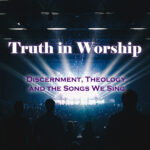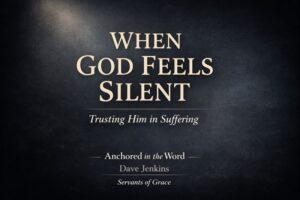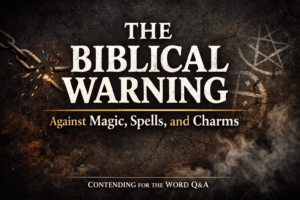⏱️ Estimated Reading Time: 6 min read
The Dangerous Theology of Bethel Worship and Similar Movements
By Dave Jenkins
Bethel Church in Redding, California, has become one of the most influential worship movements in the world. Through its music label, Bethel Music, and global conferences, Bethel has shaped the worship sound and experience in thousands of churches. But behind the soaring melodies and emotionally charged lyrics lies a dangerous theology that distorts biblical truth, elevates experience over Scripture, and promotes unbiblical views of God, man, and the Church.
A Brief History and Theological Overview
Bethel Church is led by Bill Johnson and is closely associated with the New Apostolic Reformation (NAR)—a movement that claims modern-day “apostles” and “prophets” continue to receive authoritative revelation, placing their words on-par with canonized Scripture. Johnson teaches a theology of signs and wonders, miraculous healings, and personal prophecy, often divorced from biblical exegesis or historical orthodoxy.
Central to Bethel’s vision is the idea that believers can “bring heaven to earth,” a phrase repeated throughout their music and sermons. While Scripture indeed speaks of God’s kingdom coming (Matthew 6:10), Bethel’s interpretation often emphasizes dominionist overtones, personal empowerment, and experiential encounters with God that minimize the authority of Scripture.
The Theology Behind the Music
Bethel Music is not neutral. The lyrics often subtly promote their theology: victory declarations, emotional highs, and vague references to divine presence without clearly defined biblical context. Songs like “You Make Me Brave”, “Reckless Love”, and “This is a Move” use emotionally charged language to stir the affections—but without anchoring in sound doctrine.
These songs are frequently sung in churches that would never endorse Bethel’s theology from the pulpit. Yet by adopting their music, churches unintentionally platform their theology and open their congregations to potentially dangerous influences. Worship is discipleship—what we sing shapes what we believe (Colossians 3:16).
Moreover, Bethel’s songs often lack the theological precision of historic hymns or biblically grounded contemporary worship. Phrases like “reckless love” introduce doctrinal confusion. God’s love is abundant and sacrificial—but it is not reckless. Words matter. The theology embedded in our singing forms our view of God, the gospel, and Christian life.
Unbiblical Practices and Doctrinal Errors
Bethel leaders have publicly endorsed grave-soaking (lying on the graves of deceased revivalists to absorb their “anointing”), prophetic declarations detached from Scripture, and false healings. Their School of Supernatural Ministry trains students to perform “miracles” and “healings” without biblical grounding. These practices mirror the Gnostic pursuit of secret knowledge and power, rather than humble submission to God’s Word.
Scripture warns against those who perform signs to deceive (Deuteronomy 13:1–5; Matthew 24:24). True worship is rooted in truth (John 4:24), not in emotionalism or mystical experiences. When signs and wonders take precedence over the gospel and sound doctrine, the Church is on dangerous ground. The theology promoted at Bethel often distorts the gospel. Instead of calling sinners to repentance and faith in Christ, it emphasizes “breakthroughs”, healing, and empowerment. This prosperity-adjacent gospel appeals to felt needs while ignoring sin, righteousness, and judgment (John 16:8).
The Money Behind the Movement
Bethel’s worship empire generates tens of millions of dollars annually through music sales, conferences, and training programs. Their songs top charts and are streamed by the millions. But this isn’t simply about good music—it’s a brand that funds a broader theological agenda. Churches that use Bethel music pay royalties, often unknowingly supporting a ministry that actively promotes false teaching.
According to publicly available data, Bethel Music and its affiliates operate as a commercial enterprise within a religious wrapper. Their conferences cost hundreds of dollars to attend, merchandise sales are robust, and music licensing through CCLI ensures ongoing revenue. We must ask, “Would we use worship songs produced by a cult if the lyrics seemed biblically sound?” The source matters. The theology behind the music matters. And the financial support we give through CCLI licenses and streaming has real-world implications.
A Call to Discernment for Churches and Christians
Pastors and worship leaders must be theologically vigilant. Just as they would never allow false doctrine in the pulpit, they must guard against it in the worship set. Singing songs from Bethel, Hillsong, Elevation, or other theologically compromised sources without discernment opens the door to syncretism.
Discernment requires study, prayer, and courage. Churches must equip their people to recognize theological error, even when it comes packaged in beautiful melodies. If we care about truth, we must also care about what we sing. This also applies to evaluating whether to remain in a church that consistently uses music from theologically compromised sources. Is the leadership aware? Are they taking steps to teach discernment? Is the use of this music an isolated issue or part of a broader theological drift? These are serious questions that require prayerful reflection.
Many faithful pastors may not be aware of Bethel’s theology. A gracious conversation can open the door to deeper study and correction. But when music becomes a hill to die on—exalting style and brand over substance and truth—it’s time to reevaluate.
Returning to Biblical Worship
Biblical worship is God-centered, Christ-exalting, Spirit-empowered, and Word-saturated. It flows from hearts renewed by grace and minds shaped by Scripture. The songs we sing should reflect sound theology and help believers grow in maturity, not just emotion.
Historically, the Church has valued congregational singing rooted in doctrine. The Psalms, the hymns of the Reformation, and even many 19th-century gospel songs were rich in biblical content. Today, we must recover that legacy—not by being old-fashioned, but by being faithful.
Worship is not entertainment. It is not about generating a feeling or chasing an experience. It is the gathered Church lifting praise to the Triune God, shaped by His Word and in reverence of His holiness. Churches would be wise to evaluate their worship songs not only for lyrical content but for theological source, doctrinal depth, and congregational edification. A worship culture shaped by biblical truth will produce fruit far beyond a Sunday morning high.
Conclusion: Truth Matters in Worship
The influence of Bethel Worship (and others of the like) is immense, but so is the responsibility of the Church to be faithful. We cannot afford to be careless in what we sing or who we platform. Theology matters—especially in worship. If we truly believe that worship is for God and not for man, then our music must reflect His truth, not our preferences.
Let us return to worship that is rooted in the Word, rich in doctrine, and reverent in tone. Let us sing songs that proclaim the gospel clearly, exalt Christ rightly, and build up the Church faithfully. Discernment is not division. It is love for the truth and protection for the flock. And in our worship, as in every other area of life, we must test everything by the Word of God (1 Thessalonians 5:21).




